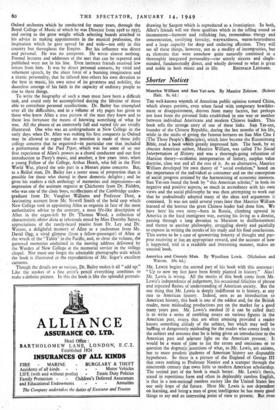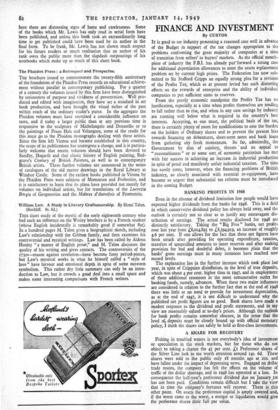America and Cosmic Man. By Wyndham Lewis. (Nicholson and Watson.
10s. 6c1.)_
MR. LEWIS begins the second part of his book with this sentence : " Up to now my feet have been firmly planted in history." Alas ! Mr. Lewis is wrong. All the merits of this book come from Mr. Lewis's independence of judgement, his occasional felicities of phrase and repeated flashes of understanding of American society. But the one thing that Mr. Lewis is deeply indifferent to is history, at any rate to American history. Indeed, seen as an introduction to -American history, this book is one of the oddest and, for the British reader, most misleading productions put on the market for a good many 'years past. Mr. Lewis's method (if it can be called that) is to write a series of rambling essays on various figures in the American past, essay that are often amusing provided a reader knows something alrEady of the subject, but which may well be baffling or dangerously misleading for the reader who comes fresh to the subject and assumes that he is being given an introduction in,the American past and mtlevant light on the American present: It would be a waste of time to list the errors and omissions or to question the dogmatic assertions of what, to .Mr. Lewis, are axioms, but to more prudent students of American :history are disputable hypotheses. So there is a picture of the England. of George III that owes nothing to Professor Namier and a scamper through the nineteenth century that owes little to modern American scholarship. The second part of the book is much better. Mr. Lewis's thesis, stated in repetitious form and often in deplorably careless English, is that in a non-natiopuil. rootless society- like the United States lies
our only hope of the Here Mr. Lewis is not dependent on learning, and being's man of great intelligence he has many good things to,say and an interesting point of view to present. But even here there are distressing signs of haste and carelessness. Some of the books which Mr. Lewis has only read in serial form have been published, and unless this book took an extraordinarily long time to get published could have been used by its author in the final form. To be frank, Mr. Lewis has not shown much respect for his future readers or much realisation that an author of his rank owes the public more than the slapdash outpourings of his notebooks which make up so much of this short book.



































 Previous page
Previous page